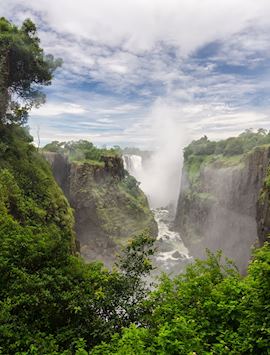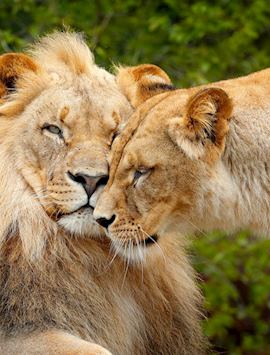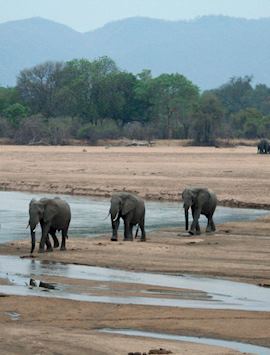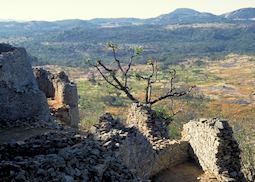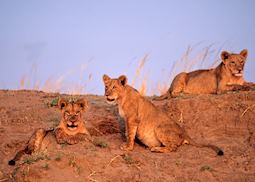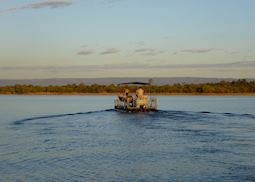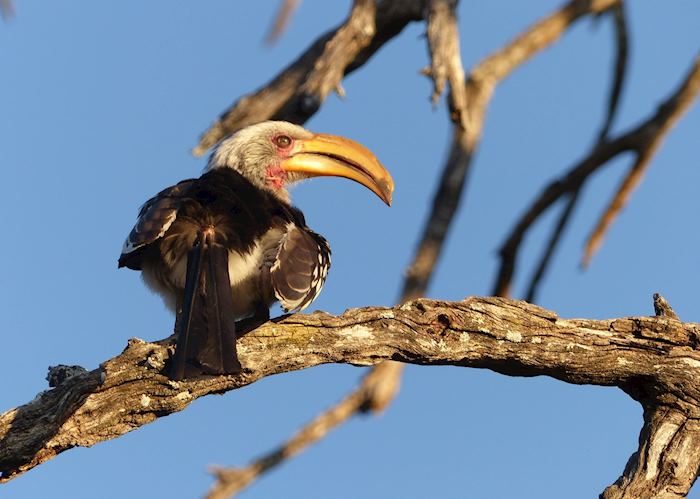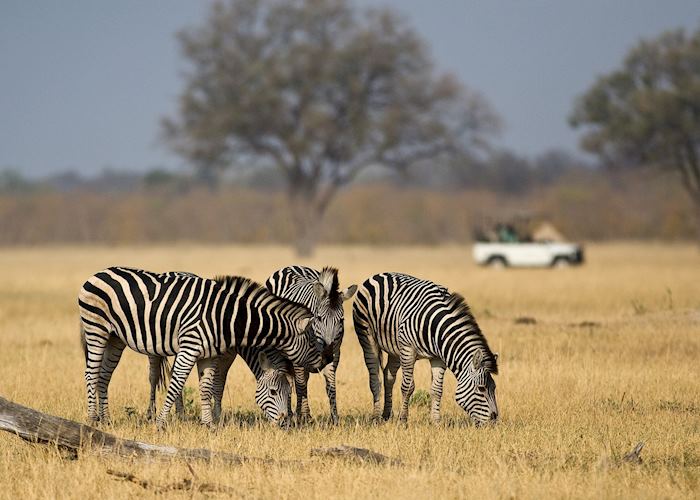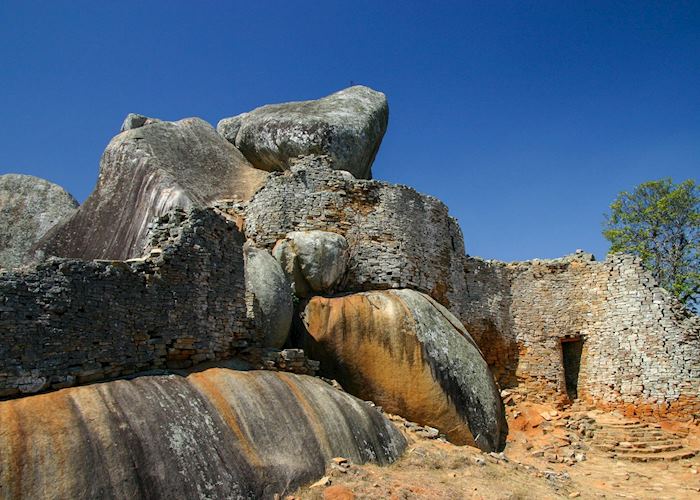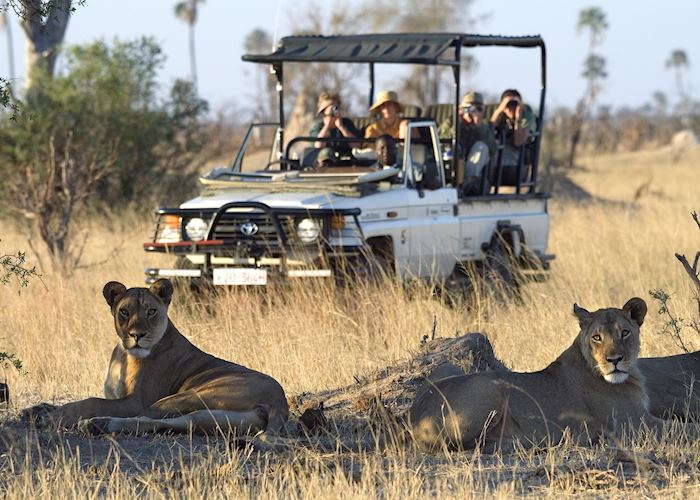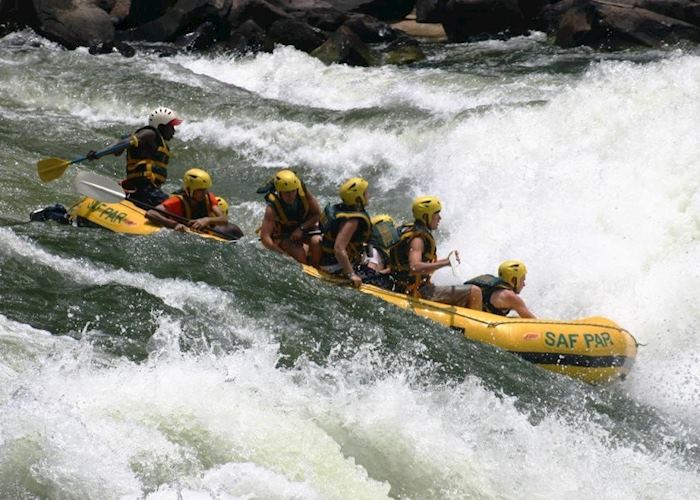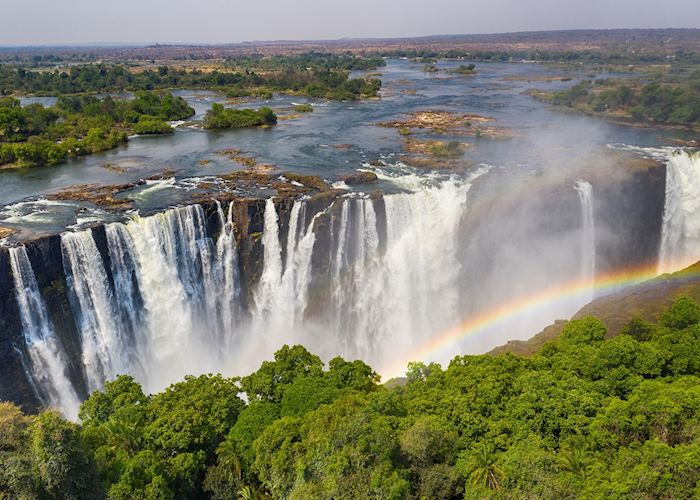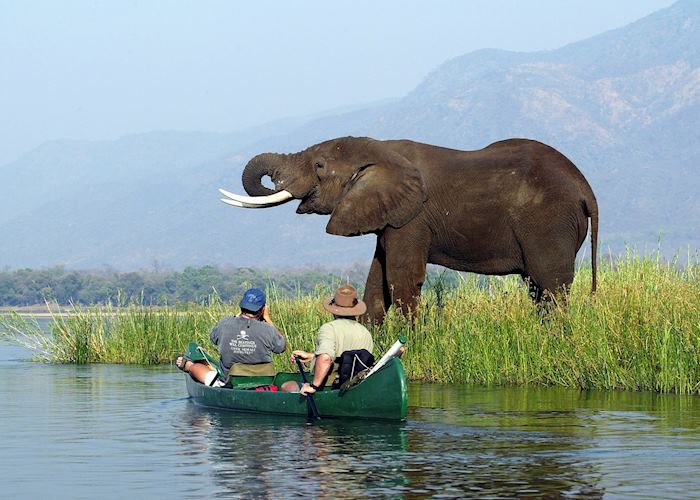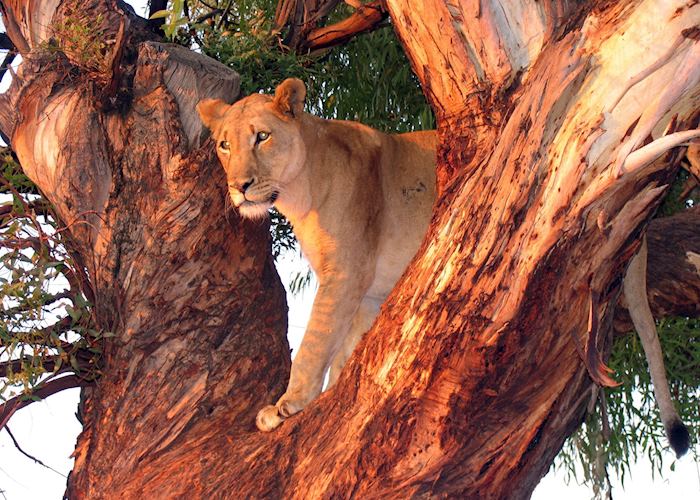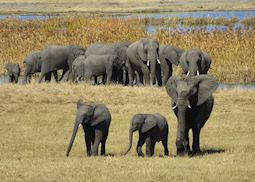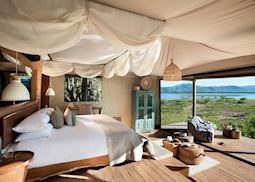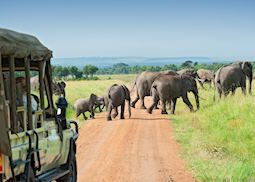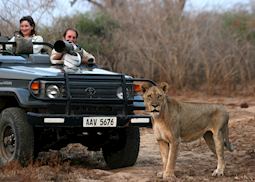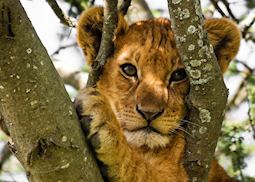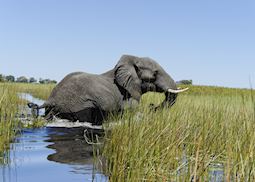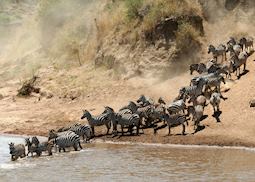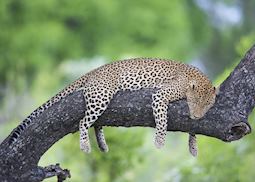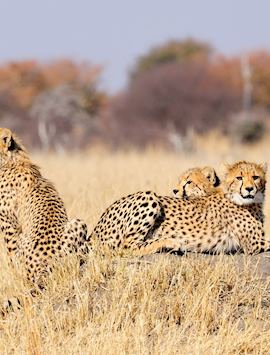
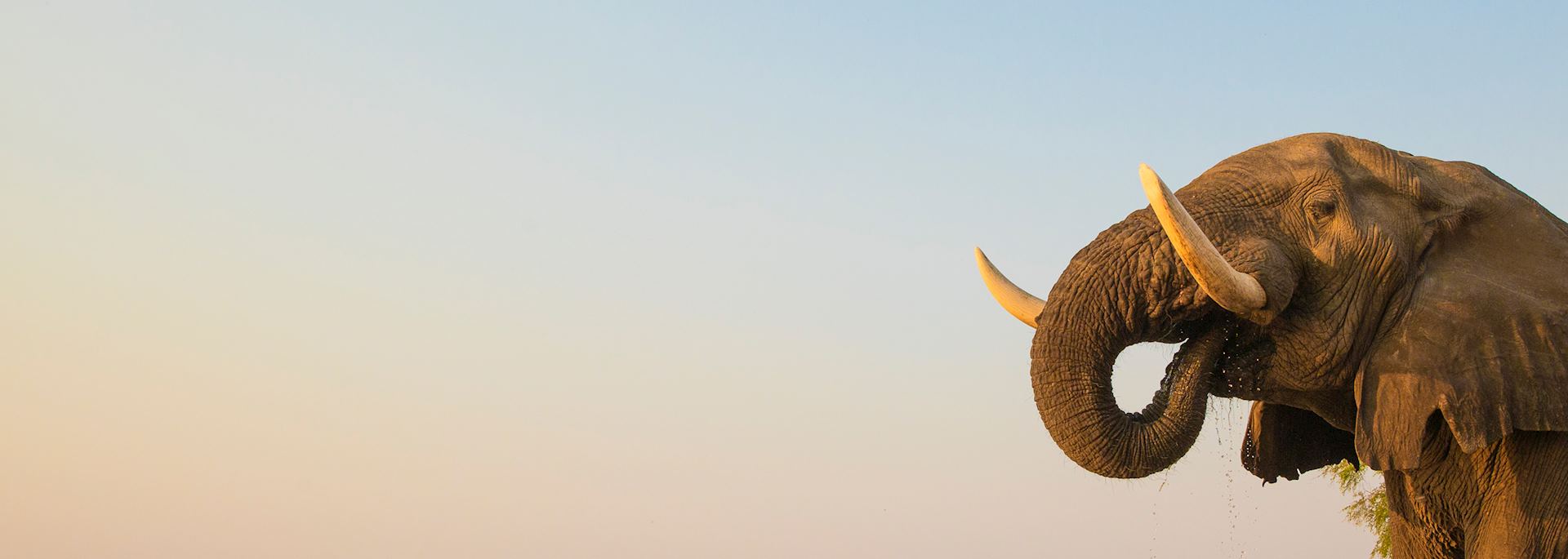
Tailor-made Zimbabwe holidays shaped around your passions
The sight of a fish eagle swooping over Lake Kariba’s smooth waters. The roar of a lion pride, out hunting at dusk. And, the musky smell of elephant marching past your vehicle in search of their next waterhole. A safari in Zimbabwe piques all the senses. With the help of some of the most highly trained guides in Africa, you have a good chance of seeing the Big Five, alongside an ensemble of other wildlife. Our safari specialists have visited the country extensively and can put together a trip that best suits your interests, such as the animals you most want to encounter.
Beyond a safari, a holiday to Zimbabwe gives you the opportunity to visit Victoria Falls and take in the thundering water by boat or helicopter or on foot. There’s also a rich history to uncover, from ancient rock art in Matobo National Park, to the Great Zimbabwe National Monument — a long-abandoned hilltop city.
Suggested tours for Zimbabwe
These tours give you a starting point for what your holiday to Zimbabwe could entail. Treat them as inspiration, as each trip is created uniquely for you.
Suggested activities for Zimbabwe
Whatever your interests, our specialists will build activities into your trip that connect to how you want to experience Zimbabwe.
-
Explore the ancient city walls of Great Zimbabwe ![Great Zimbabwe, Zimbabwe]()
Explore the ancient city walls of Great Zimbabwe
Great ZimbabweExplore the ancient city walls of Great Zimbabwe
A UNESCO World Heritage Site, Great Zimbabwe is a ruined city that was once the capital of the Kingdom of Zimbabwe.
View details -
Walking Safari in Mana Pools National Park ![Young lion in Mana Pools]()
Walking Safari in Mana Pools National Park
Mana Pools National ParkWalking Safari in Mana Pools National Park
Mana Pools has large tracts of wilderness only accessible on foot. Experienced guides reveal big game as well as many smaller things such as animal tracks, insects and brightly coloured birds.
View details -
Sundowner drinks on Lake Kariba ![Evening boat safari from Musango Safari Camp, Lake Kariba]()
Sundowner drinks on Lake Kariba
Lake KaribaSundowner drinks on Lake Kariba
Take a boat trip on Lake Kariba as the sun sets. Perhaps try your hand at tiger fishing before relaxing with a cold glass of wine, couple of snacks and beautiful setting sun.
View details
More choice for your safari
- Inspiration across all our African destinations
- Trip suggestions based on your interests
- Advice on where to safari, when
- Meet our team of safari experts
Best time to visit
Our specialists advise on the best months to visit Zimbabwe, including information about climate, events and festivals.
Request our brochure
Covering all seven continents, The World Your Way shows you how you can see the world with us. It features trip ideas from our specialists alongside hand-picked stays and experiences, and introduces our approach to creating meaningful travel experiences.
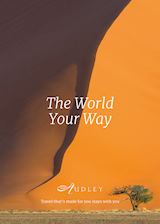
Useful information for planning your holiday in Zimbabwe
The main languages spoken in Zimbabwe are Shona, Ndebele, and English. Everyone working in popular visitor destinations speaks good English, so communication is generally easy.
The currency of Zimbabwe is the RTGS dollar (ZWL). Due to hyperinflation, the financial situation in Zimbabwe is volatile. ATMs often run out of cash, and banks may not have enough currency to accommodate your requests.
US dollars are widely accepted in camps, lodges, hotels, and restaurants and we recommend carrying US dollars in several separate packages of smaller denomination notes. Avoid US$100 notes because nobody in Zimbabwe, including banks, will accept them due to a spate of forgeries.
Credit and debit cards are useful but aren’t always accepted in safari camps and lodges.
In Zimbabwe you should try muriwo unedovi (cabbage, spinach, or pumpkin leaves in a peanut sauce), muboora (pumpkin-leaf soup or stew), and sadza (a thick maize porridge that is rolled into a ball and dipped into a variety of stews). Other dishes to look out for include bota (peanut butter porridge), dovi (peanut stew), and mapopo candy (cooked papaya dusted with sugar).
You’ll find a good choice of places to eat from local markets to international restaurants in larger towns and cities, while most hotels and lodges catering to foreign visitors serve an international menu.
A 10% tip is standard in larger restaurants in Zimbabwe. Guides will appreciate a tip at the end of your stay in a lodge, but as the financial situation here is so unpredictable, it’s best to speak to your specialist for what amounts are appropriate. If you’d like to tip staff at your lodge, you can contribute to the communal tipping box.
For the latest travel advice for Zimbabwe, including entry requirements, health information, and the safety and security situation, please refer to the Foreign, Commonwealth & Development Office website.
In Zimbabwe you can go on safari to see elephant, lion, giraffe, and hippo, visit Victoria Falls, see ancient rock art, and explore abandoned cities. Zimbabwe is a rewarding destination for a safari experience with highly trained guides and a good chance of seeing the Big Five alongside an abundance of other wildlife.
You can walk through the mist to feel the force of Victoria Falls rumble underfoot as you approach this natural wonder or fly over the towering cascades for a bird’s eye view. Delve into Zimbabwe’s rich history by exploring a long-abandoned hilltop city or visiting the site of ancient rock art, or simply relax by a pool with a sundowner and enjoy the dramatic landscapes before you.
Zimbabwe offers a great choice of places to stay, from historic hotels to luxurious safari lodges and mobile camps that follow the wildlife. For the best experience, you might want to combine a stay in a rustic tented camp where the focus is getting close to nature with some time in a more exclusive lodge where a dramatic landscape is matched by indulgent contemporary design.
We’ve got plenty of options to choose from including small safari camps overlooking busy waterholes, private villas with balconies for wildlife watching, or a luxurious tented camp on the banks of the Zambezi. Elsewhere, you can stay at a historic hotel overlooking Victoria Falls, or wilderness chalets on a private concession. Take a look at our collection of places to stay in Zimbabwe for more ideas.
Most visitors to Zimbabwe choose to go to Hwange or Mana Pools national parks, Lake Kariba, or one of the country’s many private concessions before or after a visit to Victoria Falls. Wildlife viewing is a prime reason to visit, and Hwange National Park is the country’s top safari destination, offering the chance to see large herds of elephant and buffalo, big cats, and antelope grazing in woodlands and grasslands.
Set on the banks of the Zambezi River, the lakes and floodplains of the Mana Pools National Park have a different feel and are a good place to spot wild dog. For hippo, crocodile, and fish eagle sightings, we recommend a sunset boat trip on Lake Kariba. It’s also easy to combine time on safari with a visit to Victoria Falls, where the Zambezi plunges over steep cliffs in a thundering torrent.
Zimbabwe is a good place to spot the Big Five — lion, elephant, rhino, buffalo, and leopard — as well as cheetah, spotted hyena, wildebeest, zebra, and eland. Depending on the time of year, and your destination, you’ll encounter many other species too. Antelope, giraffe, bushbucks, and impala roam the grasslands, hippo and crocodiles lurk in the rivers and lakes, and Hwange has a large population of wild dog. Zimbabwe’s birdlife is also prolific with more than 400 bird species present in Mana Pools National Park and some lodges even guaranteeing sightings of 50 species before breakfast.
If takes between 13 and 18 hours to fly from the UK to Zimbabwe.
The time zone in Zimbabwe is UTC+2 hours. Daylight Savings Time is not observed here.
The best way to get around Zimbabwe is to combine private transfers with some internal flights. The road network in Zimbabwe is well maintained and with a local guide to give you an insight into the landscape, history, and culture of places you pass, you’ll get so much more out of your drive. When transferring between parks or destinations at a distance from one another, travel by light aircraft is fast and efficient.
Your doctor can provide you with vaccine advice for Zimbabwe, but you should also ensure you’re up to date with the recommended vaccinations for your home country. You can also check the suggested vaccinations on the Travel Health Pro website.
Malaria is a risk in parts of Zimbabwe and you should speak to your doctor about which antimalarial medication you should take. Your first line of defence, however, is to avoid being bitten by mosquitoes. Wear long-sleeved and long-legged clothing, use an insect repellent with 50% DEET, and a mosquito net if sleeping in rooms where windows and doors are unscreened.
Check that your passport is valid for at least six months from the date you arrive in Zimbabwe and has a minimum of three blank pages.
Zimbabwe in pictures
Our expert guides to travelling in Zimbabwe
Written by our specialists from the viewpoint of their own travels, these guides will help you decide on the shape of your own trip to Zimbabwe. Aiming to inspire and inform, we share our recommendations for how to appreciate Zimbabwe at its best.
-
Zimbabwe safaris ![Elephants at a waterhole in Zimbabwe]()
Zimbabwe safaris
Zimbabwe safaris
With exceptional guides, several national parks and a variety of wildlife, including the Big Five, Zimbabwe offers an authentic safari experience that can easily be coupled with a trip to Victoria Falls. Africa specialist Amelia outlines what makes a Zimbabwe safari special.
Read this guide -
Luxury safaris in Zimbabwe ![Nyamatusi Camp, Mana Pools]()
Luxury safaris in Zimbabwe
Luxury safaris in Zimbabwe
With the most highly trained guides in Africa, camps and lodges that balance comfort and rusticity, and wildlife areas renowned for big cats and wild dog, Zimbabwe offers safaris of the highest level. Safari specialist Tony shares his ideas for a luxurious stay.
Read this guide -
Africa’s best safari areas ![Elephant crossing, Masai Mara]()
Africa’s best safari areas
Africa’s best safari areas
You’re spoiled for choice when it comes to picking an Africa safari destination, but where do you begin? Our safari specialists round up their best six wildlife areas on the continent to help you decide where to plan your next safari.
Read this guide -
A typical day on an African safari ![Game drive with Shenton Safaris]()
A typical day on an African safari
A typical day on an African safari
A typical day on safari essentially revolves around the need to see the wildlife at its most active. It usually follows a similar routine with slight variations between destinations and seasons.
Read this guide
